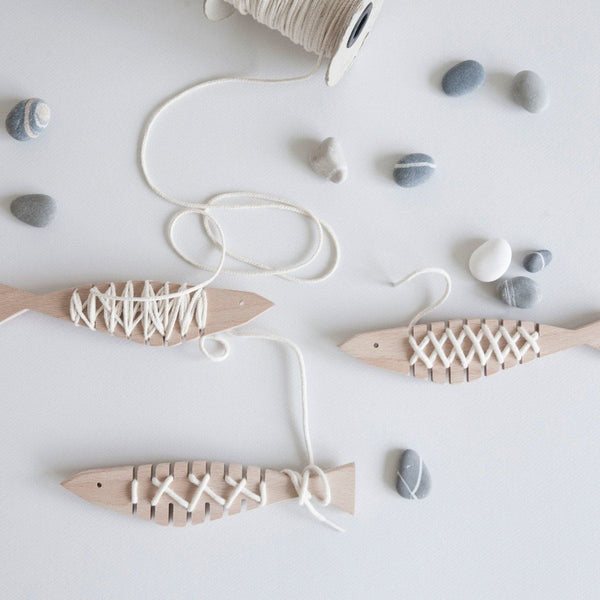Lacing & threading toys are a great creative & educational way to help little ones develop their fine motor skills...
these fun & effective developmental toys help little ones with their fine motor skills, help build and strengthen a toddler's grip, improve bilateral coordination, developing motor planning, and build concentration and patience. These seemingly simple toys have a surprising range of benefits for young children offering a hands-on experience that helps children develop their fine motor skills with the act of threading a string through the holes of a toy or lacing beads that also requires concentration and precise hand-eye coordination.

This repetitive movement not only improves dexterity but also strengthens the muscles in the fingers and hands, preparing them for more complex tasks like writing and drawing. But that's not all - lacing and threading toys also encourage creativity and problem-solving. Children can explore different patterns and colour combinations as they string beads or lace strings, giving free rein to their imagination. This type of play promotes cognitive development, spatial awareness, and critical thinking skills. So, whether your child is creating a masterpiece or simply having fun, lacing and threading toys provide a valuable learning opportunity. Watch as their fine motor skills and creativity thrive with these delightful toys.

What age are lacing toys for?
By the age of 2, most children will of learned how to pick up objects with a pincer grip (forefinger & thumb) an essential fine motor skill, moving on from the full palm grasp. So from two up a toddlers should be able to pick up lacing toys making them an excellent educational activity for toddlers to primary schooler to help them improve their hand-eye coordination and problem solving skills, as well as encouraging creativity.
What are the benefits of lacing & threading toys?
Lacing & threading toys are a great way to help develop fine motor skills in young children as they can be used in a variety of ways. Not only do these toys improve bilateral coordination and strengthen grip, but they can also aid in developing motor planning, building concentration, and increasing patience.
1. Help build and strengthen a toddler's grip as they hold the lace/thread in a pincer grip between the thumb and another finger.

2. An effective developmental toy for fine motor skills. Holding a lace, weaving & threading all help with the ability to make small movements using the smaller muscles in a little one's hands and wrists.
3. Help improve bilateral coordination, (using both sides of the body together in an activity) as they have to hold the lacing toy in one hand whilst using the other hand to thread & weave. Why is bilateral coordination so important: because so many everyday tasks such as walking or eating involve movements & actions that involve both sides of the body!
4. Developing motor planning (the ability to work out the plan of action before engaging in a motor activity) and hand-eye coordination as they simultaneously have to use hands and eyes as they push the thread/lace through the holes.
5. Builds concentration and patience with endless possibilities of patterns that can be created by threading, sewing, lacing or tying in only one toy. Meaning they are a great toy to take with you when travelling or out & about to keep little ones occupied!
6. Help grow creativity by exploring different patterns and colour combinations, children can create their own unique designs. This process encourages them to think creatively, experiment with various arrangements, and make decisions about which colours or shapes to use. As they engage in this open-ended play, their imagination flourishes, and they develop a sense of autonomy and self-confidence.
7. Promote cognitive development by enhancing spatial awareness and visual perception. Children learn to recognise and manipulate patterns, shapes, and sizes, building a foundation for mathematical and scientific thinking. This type of play also fosters problem-solving skills as children encounter challenges and find solutions while threading or lacing.

Lacing and threading toys for different age groups
Lacing and threading toys come in various designs and complexities to cater to different age groups. Here are some examples:
1. Infants and toddlers: Soft, chunky lacing toys with large holes and easy-to-grasp pieces are suitable for this age group. These toys help develop hand-eye coordination and introduce basic concepts like colours and shapes.
2. Preschoolers: Threading toys with larger beads or buttons and simple lacing cards are ideal for preschoolers. These toys encourage fine motor skills, creativity, and early math concepts like counting and sorting.
3. School-age children: Older children can handle more intricate lacing and threading toys, such as bead sets with smaller holes or sewing cards with detailed designs. These toys challenge their fine motor skills, creativity, and problem-solving abilities.
By choosing toys that match your child's developmental stage, you provide them with the appropriate level of challenge and stimulation, ensuring their engagement and growth.

Conclusion:
When choosing lacing and threading toys, consider your child's age, interests, and developmental stage to ensure the toys provide the appropriate level of challenge and engagement. Remember to supervise your child during playtime and prioritise their safety.
So, why wait? Unlock your child's creativity and fine motor skills by introducing them to the world of lacing and threading toys. Watch as their imagination flourishes and their fingers dance with precision. It's time to embrace the surprising benefits of these delightful toys and witness your child's growth and development soar.
Thread, Focus, Create
Lacing and threading toys are more than just play — they nurture coordination, concentration, and calm. Discover our collection of beautifully made wooden sets designed to support mindful moments and early development.
Browse Lacing & Threading Toys











